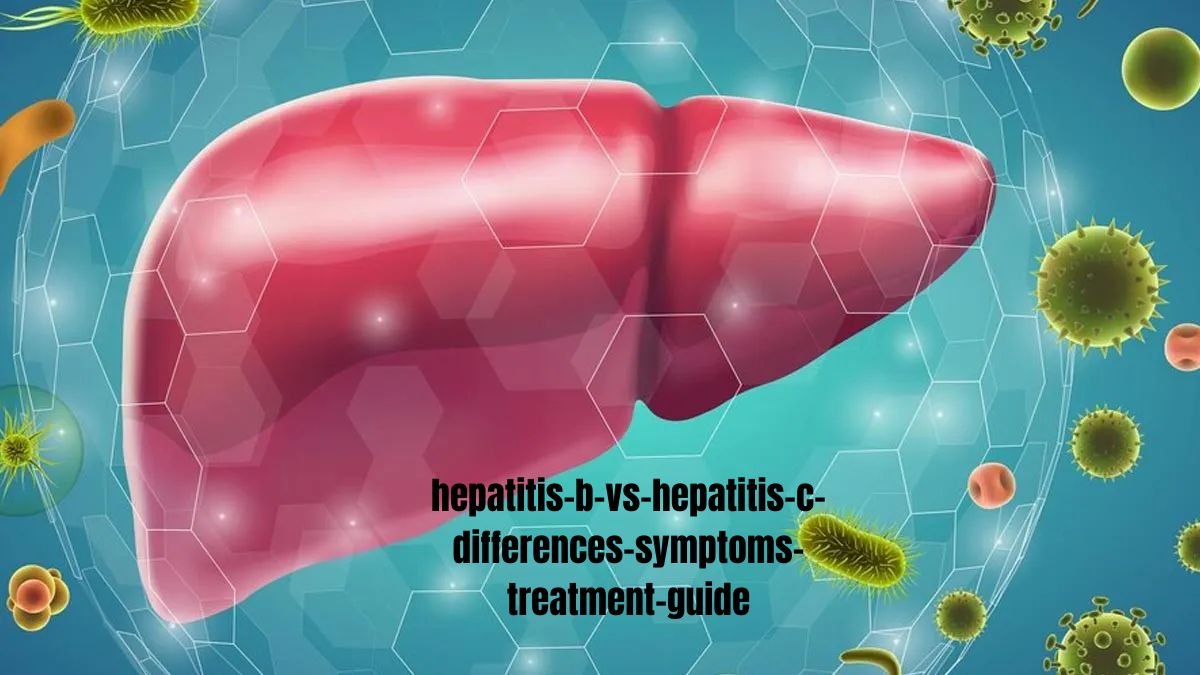The liver is a vital organ in our body. It filters blood, aids digestion, and provides energy. However, when it is attacked by viruses, it can cause serious illness. Two major liver-related diseases are hepatitis B and hepatitis C.
Both are viral infections and can cause gradual damage to the liver. However, there are several important differences in their transmission patterns, symptoms, treatment, and prevention. Let’s understand in detail.
What is hepatitis?
“Hepatitis” means inflammation of the liver. This inflammation can be caused by viruses, alcohol, medications, chemicals, or autoimmune disorders. But the most common cause is the hepatitis virus.
Hepatitis B (HBV) is caused by the hepatitis B virus.
Hepatitis C (HCV) is caused by the hepatitis C virus.
Both viruses infect the liver and weaken it. If the infection persists for a long time, it can lead to cirrhosis, liver failure, and even liver cancer.
How is the infection spread?
Hepatitis B (HBV):
- Through contact with infected blood or bodily fluids.
- Through unprotected sex.
- From an infected mother to her child at birth.
- By sharing razors, toothbrushes, needles, etc.
Hepatitis C (HCV):
- Primarily through contact with infected blood.
- Through using the same needle for injection drug use.
- Through unsafe blood transfusions in the past (very rare nowadays due to blood screening).
- Tattoos or piercings if done with unsterilized equipment.
- Mom-to-child transmission is less likely, and it is less likely to be transmitted through sexual contact than HBV.
Key differences:
HBV is transmitted through both blood and bodily fluids, while HCV is mostly transmitted only through blood.
Types of Infection: Acute and Chronic
Both viruses can be of two types:
Acute hepatitis: refers to a recent infection. It can sometimes resolve on its own within a few weeks.
Chronic hepatitis: refers to a long-term infection that continues to damage the liver for many years.
Hepatitis B:
- If an adult contracts HBV, most people overcome the virus on their own.
- However, if infected at birth or in childhood, the risk of it becoming chronic is much higher.
Hepatitis C:
- The biggest danger of HCV is that most people (about 75–85%) develop an acute infection and then develop a chronic infection.
- That is, if it is not treated, it continues to slowly damage the liver over a long period of time.
Symptoms
The initial symptoms of both infections are often very mild, so people ignore them. In many cases, symptoms may not be noticed for years.
Common symptoms:
- Fatigue and weakness
- Loss of appetite
- Vomiting or nausea
- Pain in the upper abdomen
- Dark urine and light-colored stools
- Yellowing of the eyes and skin (jaundice)
- Joint pain
Differences between HBV and HCV:
Symptoms of Acute Hepatitis B may appear within 1–5 months.
Symptoms of Acute Hepatitis C may appear between 2 weeks and 6 months after infection, but in most cases, there are no symptoms.
Long-Term Complications
If the infection is not treated promptly, both viruses can have serious consequences.
Cirrhosis: Hardening and scarring of the liver.
Liver Cancer (Hepatocellular Carcinoma): Long-term infection increases the risk of liver cancer.
Liver Failure: The liver can stop functioning completely.
Anemia and digestive problems.
Treatment Hepatitis B:
There is no permanent cure yet.
But it can be controlled.
Doctors prescribe long-term medications (such as tenofovir, entecavir, etc.) that suppress the virus and protect the liver.
Many patients may need to take medication for life.
Hepatitis C:
Modern medications called Direct-Acting Antivirals (DAAs) are available for HCV.
Most patients recover completely within 8–12 weeks with these medications.
They eliminate HCV completely, preventing further damage.
Prevention Hepatitis B:
A vaccine is available and highly effective.
Children and at-risk adults should receive it after birth.
Prevention is possible through safe sex, clean needles, and blood testing.
Hepatitis C:
There is no vaccine available.
The only way to prevent infection is through clean and safe blood transfusions, the use of sterilized equipment, and avoiding sharing drug needles.
What should I do if I suspect I have an infection?
- Immediately consult a doctor for a blood test.
- Check with a liver function test.
- Start medication and treatment as directed by your doctor.
- Avoid alcohol and liver-damaging medications.
- Get vaccinated against HBV (if I haven’t already).
- Continue regular health check-ups.
Conclusion
Hepatitis B and C are both serious diseases that gradually damage the liver. However, there are some important differences between the two Hepatitis B can be prevented with a vaccine, but its treatment is long-term and sometimes cannot be completely eradicated There is no vaccine for hepatitis C, but it can be completely cured with modern medicine.
Therefore, it is important to take preventative measures against infection, get regular checkups, and if I do develop the disease, start treatment as advised by a doctor. Taking timely action can save not only the liver but also life.
